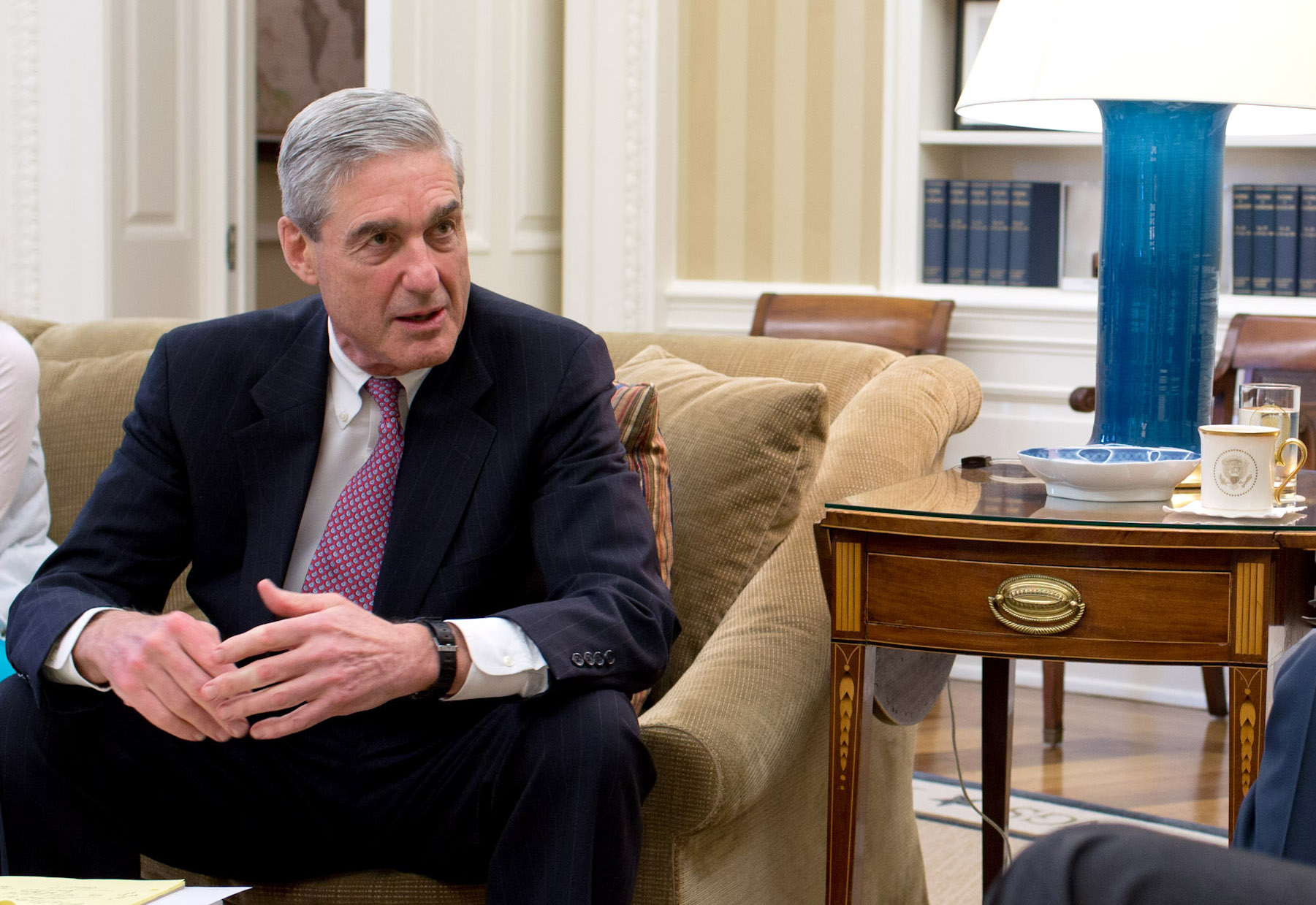How Protecting Robert Mueller Could Harm Him
Robert Mueller has been a marked man since he was appointed to his current role. President Trump wasted no opportunity to announce his wish to be rid of this meddlesome special counsel. Likewise, Russian “influence ops” and other pro-Trump outlets, including none other than Julian Assange, are attempting to undermine the U.S.

Published by The Lawfare Institute
in Cooperation With

Robert Mueller has been a marked man since he was appointed to his current role. President Trump wasted no opportunity to announce his wish to be rid of this meddlesome special counsel. Likewise, Russian “influence ops” and other pro-Trump outlets, including none other than Julian Assange, are attempting to undermine the U.S. public’s confidence in whatever Mueller might find.
Senators across the political spectrum have signaled that dismissal of Mueller would lack support on Capitol Hill. Sen. Lindsey Graham warned that firing Mueller could be “the beginning of the end” of Trump’s presidency. Last week Sens. Chris Coons and Thom Tillis introduced the Special Counsel Integrity Act to protect Mueller from removal. Later that day, Sens. Graham, Cory Booker, Sheldon Whitehouse and Richard Blumenthal introduced similar legislation, the Special Counsel Independence Protection Act. Both bills are well-intentioned, but they could also do more harm than good.
The bills share three basic provisions. First, they codify the “good cause” removal standard of current Justice Department regulations on special counsel. Second, they make the attorney general (or deputy attorney general, in this case) the sole official with removal authority. Third, if a special counsel has been fired, the bills empower a three-judge district-court panel to determine whether good cause existed and, if it finds that removal was unwarranted, to reinstate the special counsel.
In a post last week, after it emerged that legislation along these lines was being considered, Bob Bauer made a compelling argument that it would be ill-advised: an effort by members of Congress to “pass the buck” on the thorny politics implicated by genuine oversight and the prospect of impeachment. Better to grapple with those issues now, Bauer argued, rather than “return to the constitutionally murky, politically disabling conflicts invited by the last Independent Counsel law.” Later, Rick Pildes offered a more favorable view of these legislative efforts as mere codifications of safeguards that the Department of Justice had already put in place via regulation. And this week, Marty Lederman broadly aired the arguments in favor of the bills’ constitutionality, while recognizing that some aspects of the legislation tread onto untested ground.
These pieces make excellent points. But the litigation risk that these bills would create for Mueller and the potential costs of that litigation to the already impressive efficacy of Mueller’s team shouldn't be underestimated. There are at least two significant separation-of-powers arguments against these bills that play into trends in administrative law in the Supreme Court and the U.S. Court of Appeals for the D.C. Circuit. Lederman in particular finds these arguments unpersuasive, but invalidation is a real possibility should either Senate bill pass. Lawmakers should consider whether they are setting up a court battle that would undermine the special counsel far more than either bill would actually protect him.
The first argument relates to efforts to protect Mueller from removal. I am less sanguine than Pildes or Lederman that the constitutionality of removal protection is clear-cut. For much of U.S. history, the president’s power to remove executive-branch officials was understood to be more or less absolute. In Myers v. United States, the Supreme Court held as much. Chief Justice William Howard Taft, who as a former president had done some thinking on the subject, wrote the 71-page decision for a divided court, famously holding that “The power to remove inferior executive officers, like that to remove superior executive officers, is an incident of the power to appoint them, and is in its nature an executive power.”
If Myers had remained the law, the unconstitutionality of both Senate bills would be obvious. But the president’s removal authority became more complicated during the New Deal. The Supreme Court’s decision in Humphrey’s Executor approved at least some congressional efforts to give executive-branch officials “good cause” tenure. Affording Mueller with good-cause tenure would seem to be supported by Morrison v. Olson, the case that upholds the constitutionality of the independent counsel provisions of the Ethics in Government Act of 1978. A key to the independent counsel’s “independence” was good-cause tenure, supported by a provision granting district courts the final say over whether the independent counsel should be terminated.
But Morrison has its detractors. The 8-1 decision was made over a lone but now legendary dissent from Justice Antonin Scalia. Adrian Vermeule argued in a Lawfare post in early June that Morrison is no longer good law and has even entered the “anti-canon.” Legislative efforts to protect Mueller from removal would set up a test of Morrison before a Supreme Court whose makeup has changed. That is risky to say the least. Also, the D.C. Circuit is considering a direct challenge to Humphrey’s Executor (led by Ted Olson) that could make its way to the Supreme Court this year, and there is a strong chance that it could significantly limit the continued vitality of good-cause tenure, if not mark a return to Myers.
But it is not obvious that the Supreme Court needs to overrule Morrison for the removal provisions in either of the Senate bills to be vulnerable to constitutional challenge. Even assuming Morrison remains good law on the question of good-cause tenure, the judicial veto provisions in both bills go beyond Morrison. Under both bills, a three-judge panel would be empowered to assess whether the attorney general had good cause to terminate and to reinstate the special counsel if the panel determines that good cause was not shown. This sets up a stark separation-of-powers question: Can the judicial branch force the executive branch to continue to employ certain personnel?
Surprising as it may seem, and as Lederman acknowledges, the question has never been squarely answered. The seminal cases upholding good-cause tenure involved claims for back pay, not reinstatement. It is one thing to guarantee an official’s independence by ensuring that he still receives his salary if wrongfully terminated. It is quite another to force the president to continue to delegate the executive power to an undesired subordinate against his or her will.
There are not a lot of clear precedents supporting such an invasive exercise of the courts’ equitable powers. The closest analogy is the Supreme Court’s apparent willingness to order the House to seat a duly elected representative. But the collective nature of Congress as a body and the constitutional bases of its members’ qualifications for office make the analogy to the unitary structure of Article II tenuous.
The Ethics in Government Act of 1978, which created an inter-branch Rube Goldberg device for the appointment of an independent counsel, contained a similar provision authorizing judicial review of any effort to terminate an independent counsel. Morrison, however, only considers it in a footnote, and the provision was never tested in practice. Even accepting its validity under Morrison, there are significant differences between the role of the judiciary under the Ethics in Government Act and what is proposed in the Senate bills designed to protect Mueller.
The most significant difference is that under the Ethics in Government Act, the independent counsel was appointed by the judiciary in the first place. That was perhaps problematic for the reasons Justice Scalia argued in his dissent in Morrison. But the co-extensiveness of the power to hire and fire is a long-standing principle of the law governing appointments. In the context of independent counsel, it at least made sense that the judiciary could have final say over the tenure of its own appointee.
Not so here. Mueller was appointed by Deputy Attorney General Rod Rosenstein as an inferior officer within the Department of Justice. For Appointments Clause purposes, that makes his superior the attorney general. But if Mueller is no longer removable by the attorney general, only by the judiciary, then he becomes a kind of inter-branch official, appointed as an inferior to one but removable only as an inferior to another.
Is that constitutional? The answer is at best unclear. Lederman suggests that this is simply an ordinary example of judicial review. But there are no examples of anything quite like it, and the trend in both the Supreme Court and the D.C. Circuit, where these issues will be litigated, has been to be increasingly hostile to laws that blur lines of accountability when it comes to the removal of inferior officers.
The second separation-of-powers argument relates to retroactivity. Both Senate bills are attempts to protect Robert Mueller personally from removal as special counsel. The Special Counsel Independence Protection Act is silent about its effective date. But the Special Counsel Integrity Act sets its effective date back to May 17, 2017, the day Mueller was appointed.
Retroactivity outside the criminal context is normally not a big deal. But here it may be because the tenure protections these bills would afford Mueller significantly alter the nature of the office to which he was appointed.
By statute, the office of the special counsel is simply another inferior office subordinate to the attorney general for Appointments Clause purposes. That was the office to which Rod Rosenstein appointed Mueller in May. While the applicable Department of Justice regulations afforded him “good cause” tenure, those regulations were subject to the president’s willingness to change them. Mueller was and remains removable at will, his tenure protected only by the president’s reluctance to do the regulatory paperwork necessary to fire him.
If one thing is clear about the Appointments Clause, it is that Congress may not attempt to appoint its own candidates to offices within the executive branch. Beyond the Senate’s role in confirmations, Congress has no appointment power. Congress creates the offices. The president or department heads fill them. And since 1893, it has been understood that Congress may not do an end-run around these lines of accountability by fundamentally altering the nature and responsibilities of an existing office. To do so, the court has held, amounts to Congress effectively appointing its own executive officers by creating a new and distinct office around the incumbent appointee.
By retroactively affording Mueller tenure protection on par with, and perhaps beyond, that afforded to the independent counsel, there is a colorable argument that Congress has sought to appoint its own independent counsel. The reasons are understandable. Robert Mueller wears the white hat better than Elliot Ness could ever have dreamed. But congressional efforts to elevate Mueller from his position as special counsel into a quasi-independent counsel—the clear effect of both Senate bills—without requiring a second appointment to what may be considered a new (and potentially principal) office is, at the very least, in tension with a growing body of jurisprudence around the Appointments Clause.
Reasonable minds can differ over these potential questions of separation of powers: over how unitary the executive branch must be under Article II, how unfettered the removal power must be to ensure bureaucratic accountability, or whether changing the tenure rules fundamentally alters the nature of an appointed office. But these questions are significant enough under current law to wonder whether they are worth answering.
There is a real danger that passage of either Senate bill, presumably over a presidential veto, would provoke a collateral legal dispute over its constitutionality that could undermine the important work that Mueller’s team is doing. If the president fires Mueller in violation of either Senate bill, the firing becomes a matter for litigation rather than a red line for impeachment—and it is litigation that the president could very well win. Though such a win would be on constitutional “technicalities,” any victory in court is apt to be cast by this president as vindicating his decision to fire Mueller in the first place. That, in turn, could delegitimize the work of the special counsel’s office and insulate the president from political accountability he might otherwise face for firing yet another public servant whose criminal investigators were getting too close.
Even if the courts ultimately deem Mueller’s removal as illegal under the Senate bills, Congress is inviting years of litigation to reach that result. During that time, the Department of Justice, not just the president’s personal lawyers, would be pitted against Mueller and his staff. Such litigation would draw resources away from Mueller’s office. And it would distract from any legal wrongdoing that Mueller is working to uncover.





